.
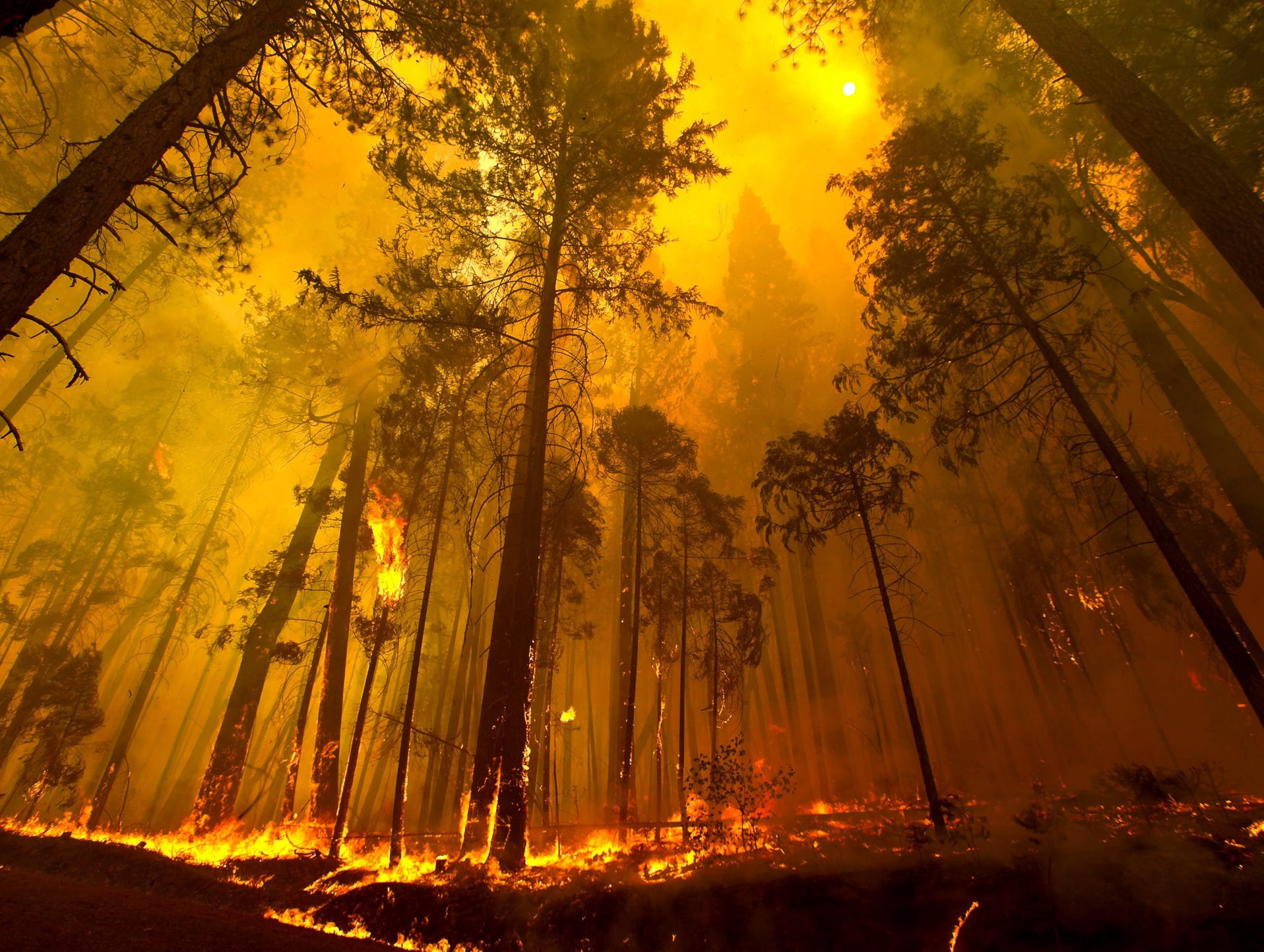
Trees burn close to City of Berkeley's Toulumne Family Camp near Groveland, California as the Rim Fire spreads: photo by Noah Berger/EPA via USA Today, 23 August 2013
- John Muir: from John of the Mountains
The clearest way into the Universe is through a forest wilderness.
I know that our bodies were made to thrive only in pure air, and the scenes in which pure air is found.
- Come to the woods, for here is rest. There is no repose
like that of the green deep woods. Here grow the wallflower
and the violet. The squirrel will come and sit upon your
knee, the logcock will wake you in the morning. Sleep in
forgetfulness of all ill. Of all the upness accessible to
mortals, there is no upness comparable to the mountains.
- No synonym for God is so perfect as Beauty. Whether as seen
carving the lines of the mountains with glaciers, or
gathering matter into stars, or planning the movements of
water, or gardening -- still all is Beauty!
- In God's wildness lies the hope of the world -- the great
fresh unblighted, unredeemed wilderness. The galling
harness of civilization drops off, and wounds heal ere we
are aware.
- The wrongs done to trees, wrongs of every sort, are done in the darkness of
ignorance and unbelief, for when the light comes, the heart of the people is always right.
When one is alone at night in the depths of these woods, the stillness is at once
awful and sublime. Every leaf seems to speak.
This grand show is eternal. It is always sunrise somewhere;
the dew is never all dried at once; a shower is forever
falling; vapor ever rising. Eternal sunrise, eternal sunset,
eternal dawn and gloaming, on seas and continents and
islands, each in its turn, as the round earth rolls.
-
Most people are on the world, not in it -- have no conscious
sympathy or relationship to anything about them --
undiffused, separate, and rigidly alone like marbles of
polished stone, touching but separate.
- How hard to realize that every camp of men or beast has this
glorious starry firmament for a roof! In such places
standing alone on the mountain-top it is easy to realize
that whatever special nests we make -- leaves and moss like
the marmots and birds, or tents or piled stone -- we all
dwell in a house of one room -- the world with the firmament
for its roof -- and are sailing the celestial spaces without
leaving any track.
Only by going alone in silence, without baggage, can one truly get into the heart of the wilderness. All other travel is mere dust and hotels and baggage and chatter.
- If my soul could get away from this so-called prison, be
granted all the list of attributes generally bestowed on
spirits, my first ramble on spirit-wings would not be among
the volcanoes of the moon. Nor should I follow the sunbeams
to their sources in the sun. I should hover about the beauty
of our own good star. I should not go moping among the
tombs, not around the artificial desolation of men. I should
study Nature's laws in all their crossings and unions; I
should follow magnetic streams to their source and follow
the shores of our magnetic oceans. I should go among the
rays of the aurora, and follow them to their beginnings, and
study their dealings and communions with other powers and
expressions of matter. And I should go to the very center
of our globe and read the whole splendid page from the
beginning. But my first journeys would be into the inner
substance of flowers, and among the folds and mazes of
Yosemite's falls. How grand to move about in the very tissue
of falling columns, and in the very birthplace of their
heavenly harmonies, looking outward as from windows of
ever-varying transparency and staining!
- Our crude civilization engenders a multitude of wants, and
law-givers are ever at their wits' end devising. The hall
and the theater and the church have been invented, and
compulsory education. Why not add compulsory recreation?
...
- Our forefathers forged chains of duty and habit, which bind
us notwithstanding our boasted freedom, and we ourselves in
desperation add link to link, groaning and making medicinal
laws for relief. Yet few think of pure rest or of the
healing power of Nature.
- Pollution, defilement, squalor are words that never would have been created
had man lived conformably to Nature. Birds, insects, bears die as cleanly and
are disposed of as beautifully as flies. The woods are full of dead and dying
trees, yet needed for their beauty to complete the beauty of the living...
How beautiful is all Death!
- The rugged old Norsemen spoke of death as Heimgang -- "home-going." So
the snow-flowers go home when they melt and flow to the sea, and the rock-ferns,
after unrolling their fronds to the light and beautifying the rocks, roll them
up close again in the autumn and blend with the soil. Myriads of rejoicing
living creatures, daily, hourly, perhaps every moment sink into death’s
arms, dust to dust, spirit to spirit-waited on, watched over, noticed only
by their Maker, each arriving at its own Heaven-dealt destiny. All the merry
dwellers of the trees and streams, and the myriad swarms of the air, called
into life by the sunbeam of a summer morning, go home through death, wings
folded perhaps in the last red rays of sunset of the day they were first tried.
Trees towering in the sky, braving storms of centuries, flowers turning faces
to the light for a single day or hour, having enjoyed their share of life’s
feast-all alike pass on and away under the law of death and love. Yet all are
our brothers and they enjoy life as we do, share Heaven’s blessings with
us, die and are buried in hallowed ground, come with us out of eternity and
return into eternity. "Our lives are rounded with a sleep."
- The snow is melting into music.
How little note is taken of the deeds of Nature! What
paper publishes her reports? ... Who publishes the sheet-music of the
winds, or the written music of water written in river-lines? Who reports
and works and ways of the clouds, those wondrous creations coming into
being every day like freshly upheaved mountains? And what recond is kept
of Nature's colors -- the clothes she wears -- of her birds, her beasts --
her live-stock?
If one pine were placed in a town square, what admiration it would excite! Yet who is conscious of the pine-tree multitudes in the free woods, though open to everybody?
Nature is always lovely, invincible, glad, whatever is done and suffered by her creatures. All scars she heals, whether in rocks or water or sky or hearts.
I only went out for a walk, and finally concluded to stay
out till sundown, for going out, I found, was really going in.
How infinitely superior to our physical senses are those of the mind!
The spiritual eye sees not only rivers of water but of air. It sees
the crystals of the rock in rapid sympathetic motion, giving
enthusiastic obedience to the sun's rays, then sinking back to rest in
the night. The whole world is in motion to the center. So also sounds.
We hear only woodpeckers and squirrels and the rush of turbulent
streams. But imagination gives us the sweet music of tiniest insect
wings, enables us to hear, all round the world, the vibration of every
needle, the waving of every bole and branch, the sound of stars in
circulation like particles in the blood. The Sierra canyons are full
of avalanche debris -- we hear them boom again, for we read past
sounds from present conditions. Again we hear the earthquake
rock-falls. Imagination is usually regarded as a synonym for the
unreal. Yet is true imagination healthful and real, no more likely to
mislead than the coarser senses. Indeed, the power of imagination
makes us infinite.
Yosemite Park is a place of rest, a refuge from the roar and dust and
weary, nervous, wasting work of the lowlands, in which one gains the
advantages of both solitude and society. Nowhere will you find more
company of a soothing peace-be-still kind. Your animal fellow beings,
so seldom regarded in civilization, and every rock-brow and mountain,
stream, and lake, and every plant soon come to be regarded as
brothers; even one learns to like the storms and clouds and tireless
winds. This one noble park is big enough and rich enough for a whole
life of study and aesthetic enjoyment. It is good for everybody, no
matter how benumbed with care, encrusted with a mail of business
habits like a tree with bark. None can escape its charms. Its natural
beauty cleans and warms like a fire, and you will be willing to stay
forever in one place like a tree.
If one pine were placed in a town square, what admiration it would excite! Yet who is conscious of the pine-tree multitudes in the free woods, though open to everybody?
Nature is always lovely, invincible, glad, whatever is done and suffered by her creatures. All scars she heals, whether in rocks or water or sky or hearts.
John Muir (1838-1914): selections from John of the Mountains: Unpublished Journals of John Muir, edited by Linnie Marsh Wolfe, 1938 (via the Sierra Club)
Satellite image of Rim Fire (below) and American Fire, California: photo by Jeff Schmaltz/NASA Earth Observatory, 23 August 2013 (NASA)
A bear and her cub cross a road near the boundary of
Yosemite National Park during massive wildfires: photo by Noah
Berger/EPA via The Guardian, 25 August 2013

Trees burn in a burnout fire as firefighters continue to battle the Rim Fire near Yosemite National Park, California, on Sunday, 25 August 2013. Fire crews are clearing brush and setting sprinklers to protect two groves of giant sequoias as a massive week-old wildfire rages along the remote northwest edge of Yosemite National Park: photo by Jae C. Hong/AP via The Weather Channel, 25 August 2013

The Rim Fire burns near Yosemite National Park, California on Saturday, 24 August 2013. Fire crews are clearing brush and setting sprinklers to protect two groves of giant sequoias as a massive week-old wildfire rages along the remote northwest edge of Yosemite National Park: photo by Jae C. Hong/AP via The Weather Channel, 25 August 2013

A forest smolders as the Rim Fire continues to burn near Yosemite National Park, California, on Saturday, 24 August 2013. Fire crews are clearing brush and setting sprinklers to protect two groves of giant sequoias as a massive week-old wildfire rages along the remote northwest edge of Yosemite National Park: photo by Jae C. Hong/AP via The Weather Channel, 25 August 2013

The Rim Fire burns near Yosemite National Park, California: photo by US Forest Service/AP, 24 August 2013
A burned tree stands near state Highway 120 as the
sun rises through a heavy smoke from the Rim Fire near Yosemite
National Park, Calif., on Sunday, 25 August 2013. With winds gusting to
50 mph on Sierra mountain ridges and flames jumping from treetop to
treetop, hundreds of firefighters have been deployed to protect this and
other communities in the path of the Rim Fire raging north of Yosemite
National Park: photo by Jae C. Hong/AP via San Jose Mercury News, 25 August 2013
Power lines are faintly seen through the smoke
generated by the Rim Fire near Yosemite National Park, California, on
Sunday, 25 August 2013. With winds gusting to 50 mph on Sierra mountain
ridges and flames jumping from treetop to treetop, hundreds of
firefighters have been deployed to protect this and other communities in
the path of the Rim Fire raging north of Yosemite National Park: photo by Jae C. Hong/AP via San Jose Mercury News, 25 August 2013
A plume of smoke rises from the Rim Fire near Yosemite
National Park, California, on Sunday, 25 August 2013. With winds gusting to
50 mph on Sierra mountain ridges and flames jumping from treetop to
treetop, hundreds of firefighters have been deployed to protect this and
other communities in the path of the Rim Fire raging north of Yosemite
National Park: photo by Jae C. Hong/AP via San Jose Mercury News, 25 August 2013
A pall of smoke rises from smoldering trees as
firefighters continue to battle the Rim Fire near Yosemite National
Park, California, on Sunday, 25 August 2013. With winds gusting to 50 mph on
Sierra mountain ridges and flames jumping from treetop to treetop,
hundreds of firefighters have been deployed to protect this and other
communities in the path of the Rim Fire raging north of Yosemite
National Park: photo by Jae C. Hong/AP via San Jose Mercury News, 25 August 2013
A firefighter battles the Rim Fire outside of
Yosemite National Park in Groveland, California, 24 August 2013.
With the fire threatening resources used to provide water and
electricity to San Francisco, on 23 August California Governor Edmund G.
Brown Jr. extended a state of emergency to cover the city and county of
San Francisco: photo by Noah Berger/EPA via San Jose Mercury News, 25 August 2013
A cow passes a flare-up of the Rim Fire near the
Yosemite National Park border in Groveland, California, California on 24 August 2013. With the fire threatening resources used to provide water and
electricity to San Francisco, on Friday California Governor Edmund G.
Brown Jr. extended a state of emergency to cover the city and county of
San Francisco: photo by Noah Berger/EPA via San Jose Mercury News, 25 August 2013
Rim Fire: photo by US Forest Service, 24 August 2013

Merced River, Yosemite Valley, California: photo by Carleton E. Watkins, from the series Landmarks of Yosemite National Park and Pacific Coast views, California, c. 1865; image restoration by trialsanderrors, 2010 (Library of Congress)

Tuolomne River, viewed from the center of Hetch Hetchy Valley, Yosemite National Park: photo by J. N. LeConte, 1906 (US Geological Survey Photographic Library)

Vernal Fall, Yosemite National Park: photo by C. D. Walcott, September 1897 (US Geological Survey Photographic Library)
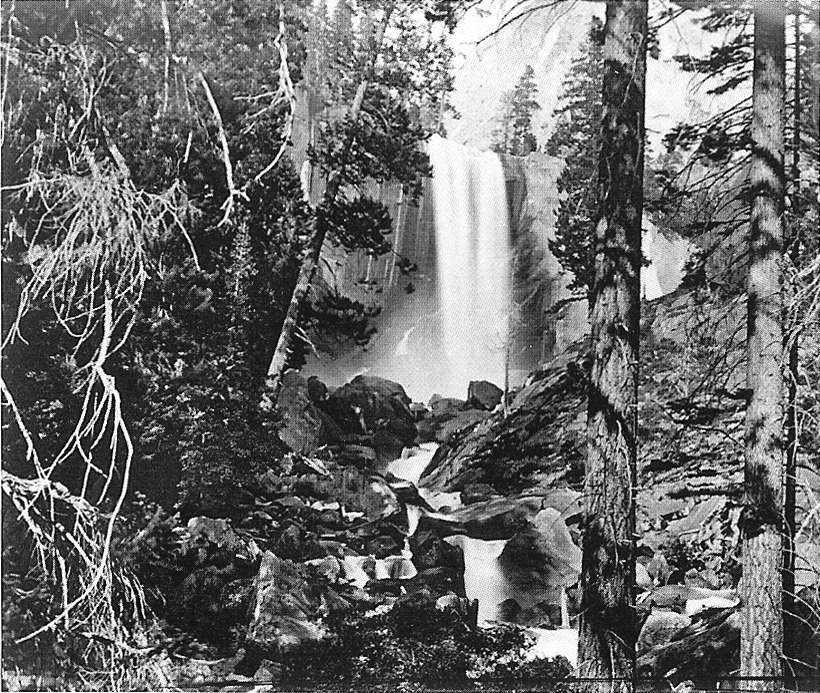
Vernal Fall, 300 feet, Yosemite: photo by Carleton E. Watkins, 1858; image by Howcheng, 1 January 2009 from Dialog Among Giants: Carleton Watkins (J. Paul Getty Center, 2008)

Ulysses S. Grant, 71 Feet in Circumference, Mariposa Grove, Yosemite, No. 87. The seated individual is Eadweard Muybridge: photo by Carleton E. Watkins, 1867; image by Howcheng, 1 January 2009 from Dialog Among Giants: Carleton Watkins (J. Paul Getty Center, 2008
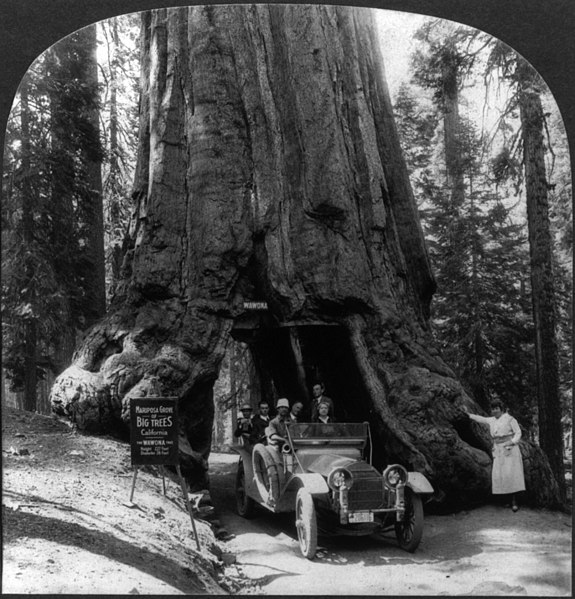
The Wawona tree, Mariposa Grove, Yosemite Valley, California. The tunnel was cut in 1881; the tree collapsed in 1969. Its estimated age was 2,300 years: photo (half of a stereograph) by Keystone View Company, c. 15 June 1918; image by Durova, 2 September 2008 (Library of Congress)

Galen Clark, first guardian of Yosemite, in front of the Grizzly Giant Tree, Mariposa Grove, Yosemite National Park: photo by Carleton E. Watkins, c. 1858-9 (Oakland Museum of California)

John Muir: photo by Francis M. Fritz, 1907 (Bancroft Library, University of California)
To the High Mountains
July 8
Toward sundown we reached Hazel Green, a charming spot on the summit of the dividing ridge between the basins of the Merced and Tuolumne, where there is a small brook flowing through hazel and dogwood thickets beneath magnificent silver firs and pines. Here we are camped for the night, our big fire, heaped high with rosiny logs and branches, is blazing like a sunrise, gladly giving back the light slowly sifted from the sunbeams of centuries of summers; and in the glow of that old sunlight how impressively surrounding objects are brought forward in relief against the outer darkness! Grasses, larkspurs, columbines, lilies, hazel bushes, and the great trees form a circle around the fire like thoughtful spectators, gazing and listening with human-like enthusiasm. The night breeze is cool, for all day we have been climbing into the upper sky, the home of the cloud mountains we so long have admired. How sweet and keen the air! Every breath a blessing. Here the sugar pine reaches its fullest development in size and beauty and number of individuals, filling every swell and hollow and down-plunging ravine almost to the exclusion of other species. A few yellow pines are still to be found as companions, and in the coolest places silver firs; but noble as these are, the sugar pine is king, and spreads long protecting arms above them while they rock and wave in sign of recognition.
We have now reached a height of six thousand feet. In the forenoon we passed along a flat part of the dividing ridge that is planted with manzanita (Arctostaphylos), some specimens the largest I have seen. I measured one, the bole of which is four feet in diameter and only eighteen inches high from the ground, where it dissolves into many wide-spreading branches forming a broad round head about ten or twelve feet high, covered with clusters of small narrow-throated pink bells. The leaves are pale green, glandular, and set on edge by a twist of the petiole. The branches seem naked; for the chocolate-colored bark is very smooth and thin, and is shed off in flakes that curl when dry. The wood is red, close-grained, hard, and heavy. I wonder how old these curious tree-bushes are, probably as old as the great pines. Indians and bears and birds and fat grubs feast on the berries, which look like small apples, often rosy on one side, green on the other. The Indians are said to make a kind of beer or cider out of them. There are many species. This one, Arctostaphylos pungens, is common hereabouts. No need have they to fear the wind, so low they are and steadfastly rooted. Even the fires that sweep the woods seldom destroy them utterly, for they rise again from the root, and some of the dry ridges they grow on are seldom touched by fire. I must try to know them better.
I miss my river songs to-night. Here Hazel Creek at its topmost springs has a voice like a bird. The wind-tones in the great trees overhead are strangely impressive, all the more because not a leaf stirs below them. But it grows late, and I must to bed. The camp is silent; everybody asleep. It seems extravagant to spend hours so precious in sleep. "He giveth his beloved sleep." Pity the poor beloved needs it, weak, weary, forspent; oh, the pity of it, to sleep in the midst of eternal, beautiful motion instead of gazing forever, like the stars.

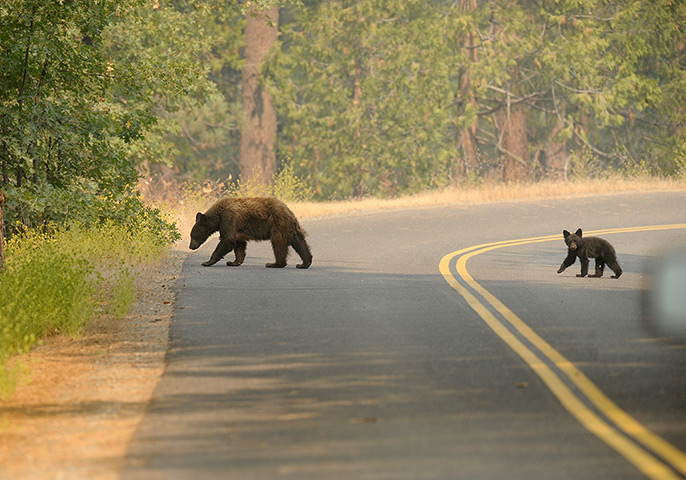









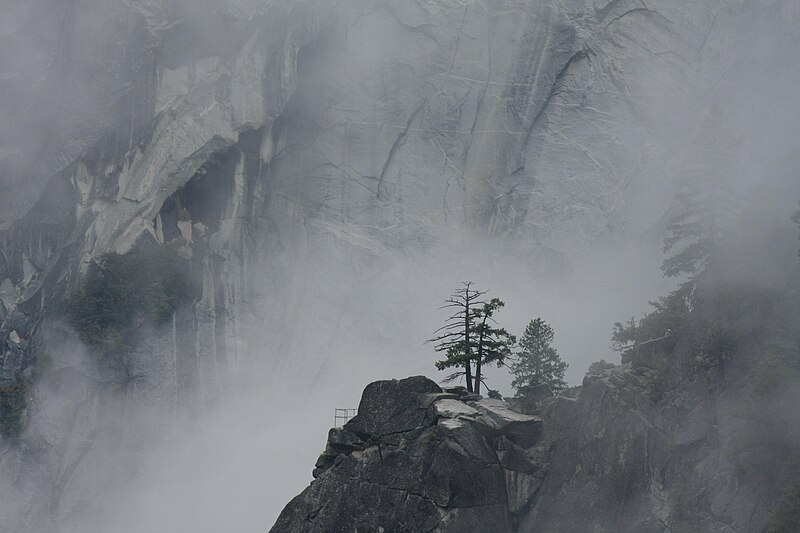
Tom,
ReplyDelete"Pollution, defilement, squalor are words that never would have been created had man lived conformably to Nature."
"The snow is melting into music."
"How little note is taken of the deeds of Nature!"
"How sweet and keen the air! Every breath a blessing."
Amen, John of the Mountains -- and thanks for this, Tom!
8.26
grey whiteness of fog against invisible
top of ridge, bird slanting toward left
foreground, no sound of wave in channel
that reflection of physical
thing, thinking about
that, that images happen at
once, to be looked at
fog against invisible shoulder of ridge,
white curve of wave in mouth of channel
"I only went out for a walk, and finally concluded to stay out till sundown, for going out, I found, was really going in".
ReplyDeleteAnd here we are with the house on fire.
First time I'd come across Muir. There's few true prophetic voices at any time.
Every leaf speaks.
ReplyDeleteMuch here to ponder and re-visit.
Thank you, Tom.
Thanks for this, Tom. The words and pictures soothe and break my heart at the same time. I suspect that what lies ahead for us all will have more of this same schizoid quality to it.
ReplyDeleteWe no longer can judge which fires are "natural" and which the consequence of our meddling. We haven't studied the forest ecosystems sufficiently to know what effect global warming is going to have. All early signs point to devastation.
ReplyDeleteWe do know that the legacy of millennia was rich, and that we are consuming that at unprecedented rates.
James Wright: "It is, and it is,/the last time."
John Muir's later life was marked by two great disappointments. The loss of his wife to lung cancer at 57. And the failure of his seven-year struggle against the damming of the Hetch Hetchy Valley.
ReplyDeleteSierra Club: Hetch Hetchy: time to redeem a historic mistake
"It is impossible to overestimate the value of wild mountains and mountain temples as places for people to grow in, recreation grounds for soul and body. They are the greatest of our natural resources, God's best gifts, but none, however high and holy, is beyond reach of the spoiler. In these ravaging money-mad days monopolizing San Francisco capitalists are now doing their best to destroy the Yosemite Park, the most wonderful of all our great mountain national parks. Beginning on the Tuolumne side, they are trying with a lot of sinful ingenuity to get the Government's permission to dam and destroy the Hetch-Hetchy Valley for a reservoir, simply that comparatively private gain may be made out of universal public loss, while of course the Sierra Club is doing all it can to save the valley. The Honorable Secretary of the Interior has not yet announced his decision in the case, but in all that has come and gone nothing discouraging is yet in sight on our side of the fight.
"As long as the busy public in general knew little or nothing about the Hetch-Hetchy Valley, the few cunning drivers of the damming scheme, working in darkness like moles in a low-lying meadow..."
John Muir, Sierra Club Bulletin, January 1908
__
You can guess how that one came out.
More than a hundred years on, there remain those who believe that John Muir was right, and that drowning this glorious patch of the earth in 300 feet of water was a desecration that ought to be corrected by returning the valley to its original state.
But the rich didn't get rich by worrying too much over environmentalism and California has long been a laboratory of ruthless capitalism in action. San Francisco, one of the richest cities on earth, gets its water from Hetch Hetchy, cheap.
The guns of the redoubtable HMS Di-Fi have been brought to bear on this issue. When the Bush administration proposed allocating seven million dollars to study removal of the dam, now-U.S. senator, then-San Francisco mayor Dianne Feinstein called the proposal "dumb, dumb, dumb."
"I will do all I can to make sure it isn't included in the final bill. We're not going to remove this dam, and the funding is unnecessary."
__
Cuidado (Robinson Jeffers: Fire on the Hills)